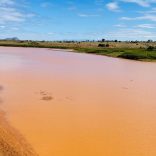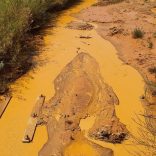Mozambique: Electricity output to fall this year due to Cahora Bassa maintenance
Mustang Resources confirms top tier Mozambican graphite project with test results

File photo / For illustration purposes only
Results demonstrate Caula’s potential to be a low-cost supplier to the expandable graphite and lithium ion battery industries.
Mustang Resources (ASX:MUS) has received results from metallurgical testing on both oxide and fresh samples from its 80% owned Caula Graphite Project in Mozambique.
The fresh sample achieved a total graphitic content (TGC) recovery of 96% and the oxide sample received a TGC recovery of 87%.
These impressive results were achieved using a simple, conventional flowsheet processing samples with a 13% TGC head grade.
Christiaan Jordaan, managing director, commented: “Not only does Caula host extensive high-grade graphite mineralisation, but preliminary metallurgical testing demonstrates that it also has more than 55% large and jumbo flakes in the fresh ore.”
“These results highlight the potential for Caula to be a low-cost graphite supplier to the fast-growing lithium battery and expandable graphite industries.”
More than half of the graphite is jumbo or large flake
Not only has the metallurgical testing shown exception recoveries from simple processing methods but more than 55% of the fresh graphite assayed has been classed as jumbo and large flake.
These results are based on non-optimised process test-work with scope for further optimisation.
This can be achieved through a coarser initial grind size and increased preservation of large and jumbo flakes in the intermediate processing stages.
Maiden JORC estimate expected in September
Mustang is currently completing its maiden JORC resource statement which it expects to release by September 2017.
The maiden JORC resource statement will underpin a scoping study for the development of the Caula Graphite Project, which is expected to commence in August 2017.
The Caula project is located along strike from Syrah Resources’ (ASX:SYR) world-class Balama graphite project in Mozambique.
The Balama deposit comprises 21% large and jumbo flakes, has a grade of 16.6%, which can be processed into a 96% concentrate.
Results to date from Caula depict how competitive the project is alongside its East African peers.












Leave a Reply
Be the First to Comment!
You must be logged in to post a comment.
You must be logged in to post a comment.